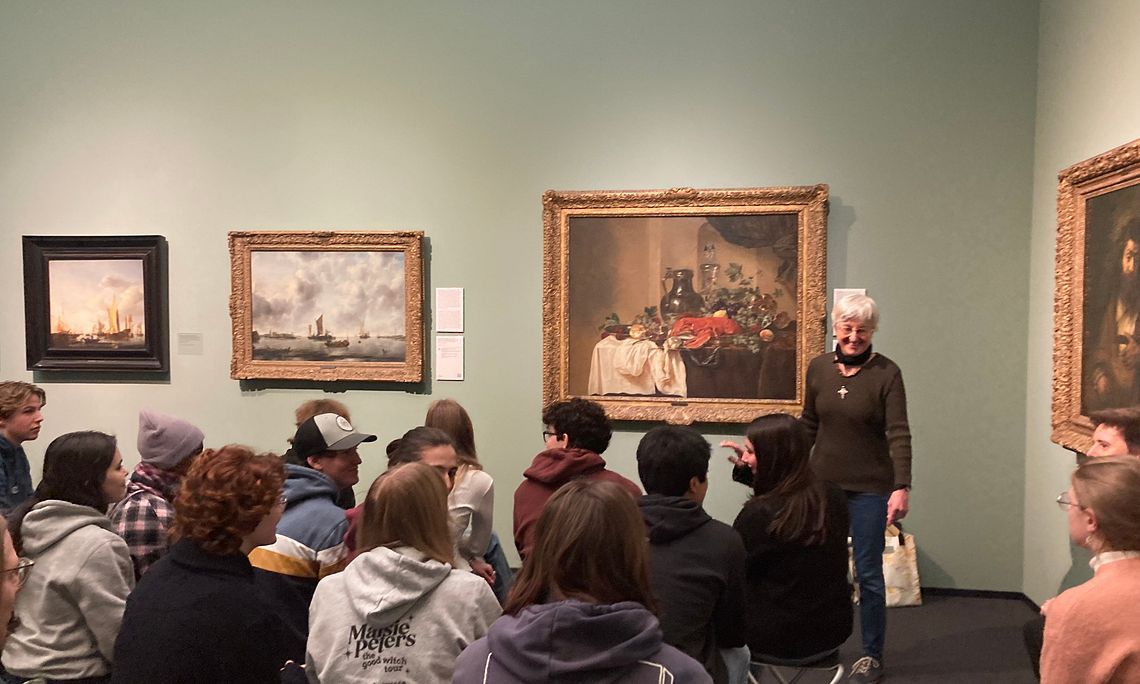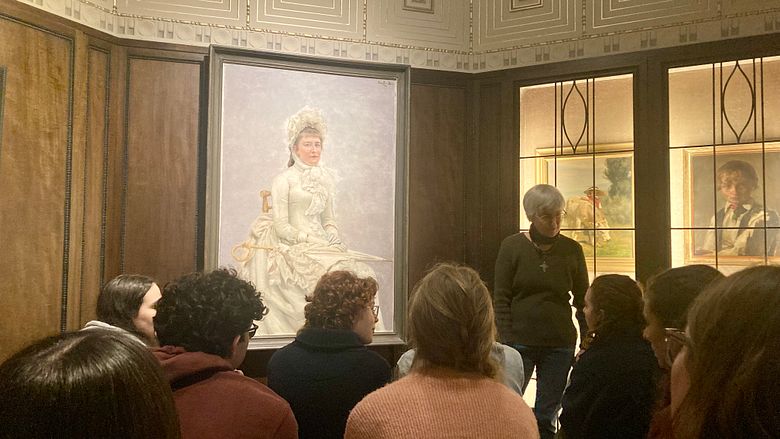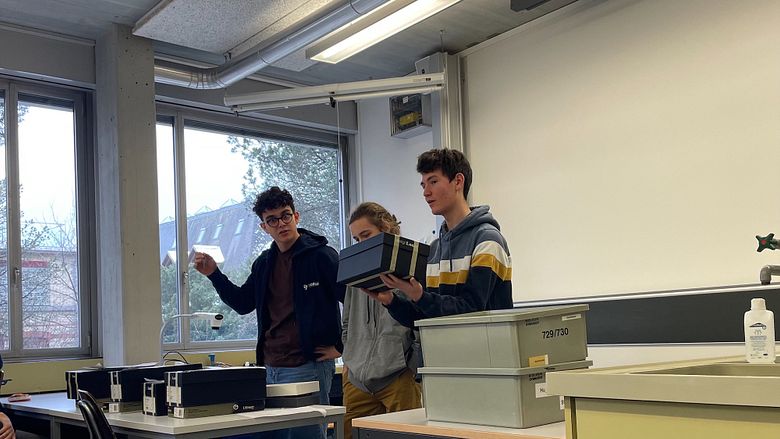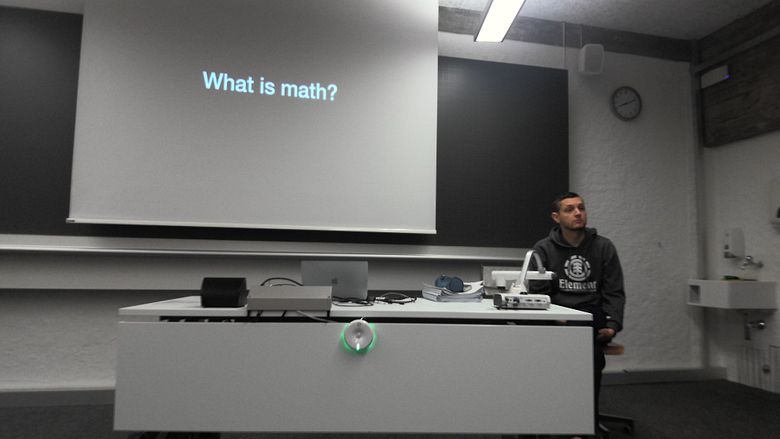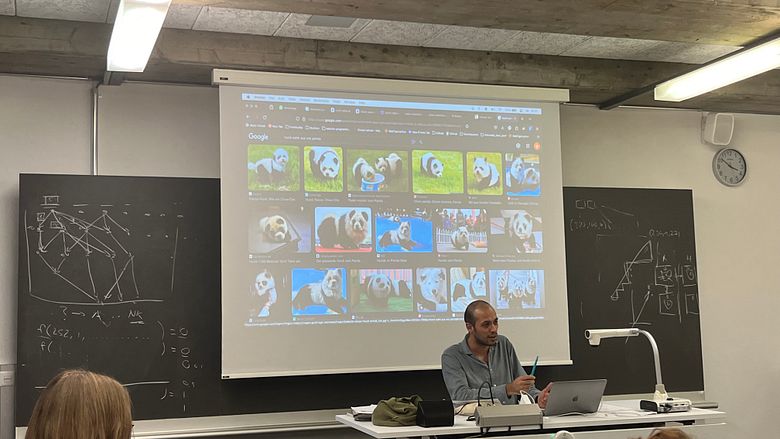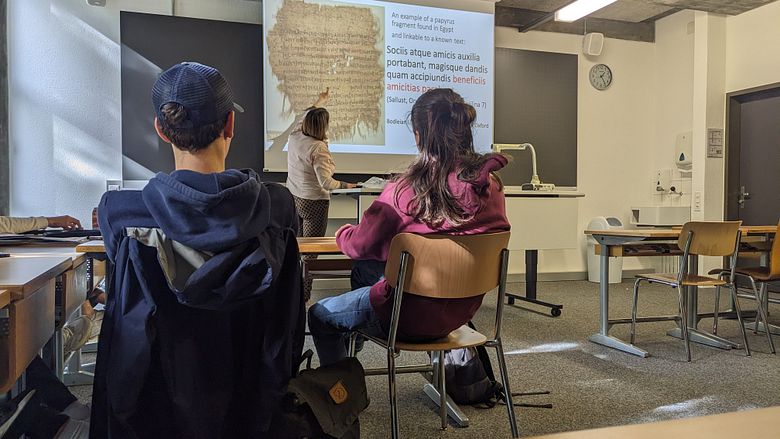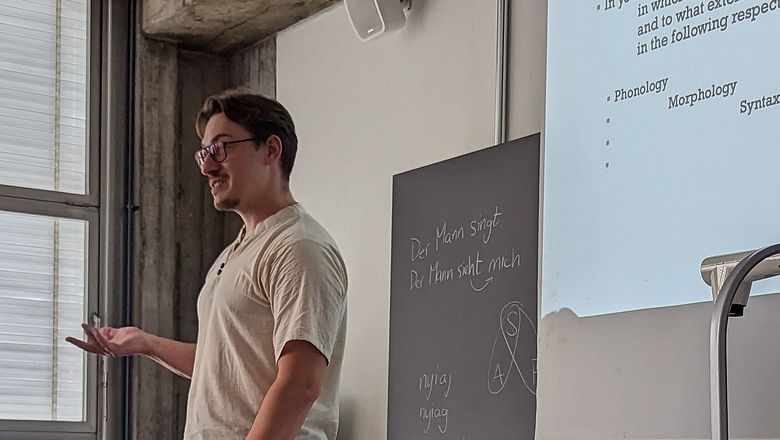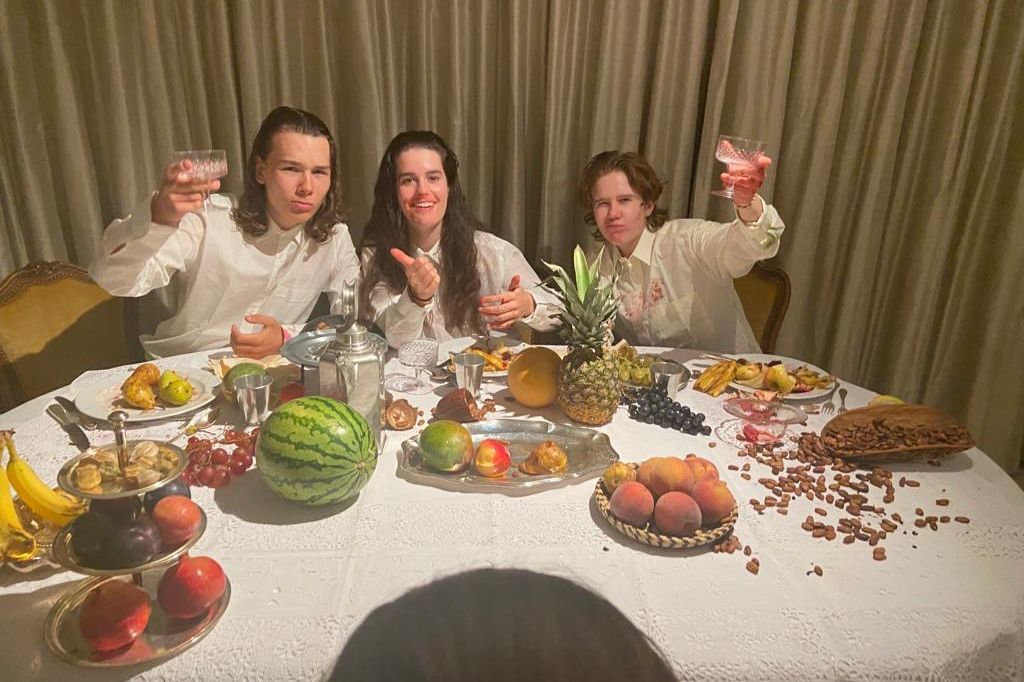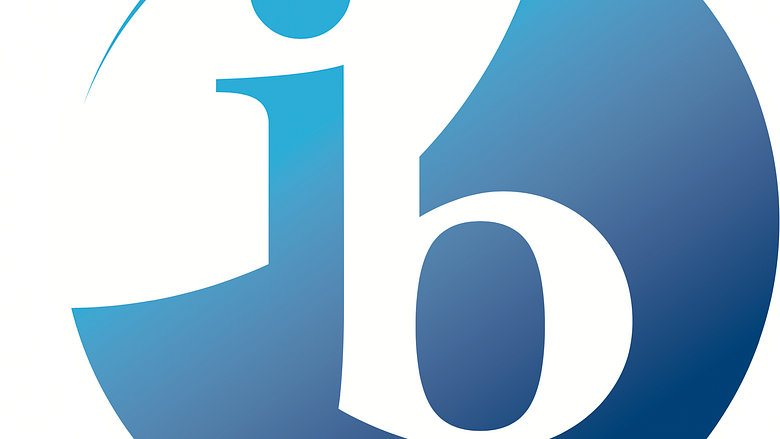
Das IB-Jahr am LG
Bis die Schülerinnen und Schüler der 6i ihr IB-Diplom in den Händen halten, durchlaufen sie über zwei Jahre ein vielfältiges Schulprogramm, zu welchem diverse Projekttage und -wochen gehören. Einen Einblick des Schuljahrs 2023/2024 finden Sie hier.
Der IB-Diplomlehrgang ist ein zweijähriges Programm für die Oberstufe von Mittelschulen. Die Philosophie der IB-Organisation deckt sich weitgehend mit jener der schweizerischen Maturität: Eine ausgewogene Allgemeinbildung ist das zentrale Anliegen. Speziell stark gewichtet werden im IB die Internationalität und das Verständnis für fremde Kulturen und Denkweisen.
Das Literargymnasium Rämibühl ist eine der beiden öffentlichen Kantonsschulen im Kanton Zürich, die den Doppelabschluss IB / Matura anbieten. Die Schülerinnen und Schüler der IB-Klassen erlangen am Ende ihrer gymnasialen Karriere sowohl den schweizerischen Maturitätsausweis als auch das weltweit anerkannte International Baccalaureate Diploma.
Das IB-Diplom umfasst auch andere innovative fächerübergreifende und überfachliche Elemente: Schülerinnen und Schüler müssen sich in gemeinnützigen, kreativen und sportlichen Projekten engagieren (CAS) und in der Theorie des Wissens (ToK), die in Form von Reflexionstagen an passenden Stellen des Curriculums eingeschoben wird, über die unterschiedliche Art, wie die einzelnen Disziplinen zu Erkenntnissen gelangen, Gedanken machen.
ToK
Neben dem Fachunterricht besuchen die Schülerinnen und Schüler des IB Programmes in der fünften Klasse den Kurs "Theory of Knowledge" (ToK).
ToK ist als Kurs über das kritische Denken neben CAS und dem Extended Essay eines der drei Fächer im Kern des IB Diplomprogramms. Im ToK geht es einerseits darum, die Fäden der verschiedenen anderen Fächer zusammenzuführen, und andererseits darum zu untersuchen, wie wir wissen, was wir behaupten zu wissen. ToK Themen sind z.B. die Untersuchung von Argumenten auf ihre Schlüssigkeit oder das Erkennen von grundlegenden unausgesprochenen Annahmen. Wichtig ist auch die Offenheit für verschiedene Perspektiven sowie das Sich-bewusst-machen, dass mit Bezug auf eine Frage verschiedene Perspektiven legitim sein können.
Der Kurs findet an über das Jahr verteilten Tagen jeweils ganztags statt. An jedem der Tage wird ein bestimmtes Wissensgebiet behandelt, z.B. Kunst, Mathematik oder Sprache. Als Abschlussarbeit beantworten die Schülerinnen und Schüler zum einen eine von 35 vorgegebenen Fragen (z.B. "Does some knowledge belong only to particular communities of knowers?") anhand von drei selbstgewählten Gegenständen. Die Antworten und Gegenstände wurden in einer Ausstellung präsentiert, zu der die Eltern der Schülerinnen und Schüler und die Klasse 4i eingeladen waren. Diese Ausstellung war ein erfolgreicher und informativer Anlass, an dem auch viele Eltern dabei waren. Als zweiten Teil der Abschlussarbeit werden die Schülerinnen und Schüler in der sechsten Klasse einen Essay zu einem von sechs vorgegebenen Titeln (z.B. "Accepting knowledge claims always involves an element of trust.") schreiben.
Aktuelles
CAS
CAS – Creativity, Activity, Service – ist einer der Kernbestandteile ("core") des IB-Programms. Schülerinnen und Schüler engagieren sich dabei im Sinne der Persönlichkeitsbildung in nicht-akademischen Bereichen. Gefördert werden Kreativität, eine aktive Lebensweise und – ganz besonders wichtig – soziales Engagement. Im Folgenden werden, aus einer Fülle an CAS-Aktivitäten, drei vorgestellt:
Project 1: Creativity
For the Energiefilm Zueri contest, we formed a group with friends from previous film projects to create a short environmental film. Together with our group, we came up with the concept of depicting the consumption of the earth by wealthy individuals with some nuances of cannibalism. The hardest part of the process of creating this movie was the communication of our stance towards tackling climate change. Aino and I wanted to address the, in our eyes necessary, system change that goes beyond individual actions. In the end we found a compromise with the others, which left all of us satisfied with the end result. Another difficulty was finding an ending for the storyline we drafted. How do you end such a movie, how do you propose possible solutions? After long discussions we landed on the idea of ending the movie abruptly, underlining the ongoing crisis that makes so many of us feel bleak and hopeless about or future. Even though this ending does not really fit with the prompt “How would you solve climate change?” given by the organisation, we all deemed it important to give a contrast and highlight another side of the issue than the rather individualist stances proposed by many of the films of last year's contest.
After a few weeks of editing and thousands of WhatsApp messages, we finally handed in our final version. We were invited to the award ceremony in the huge cinema at the Escher-Wyss Platz. All of us were incredibly nervous, but we were not expecting to win this contest, especially because our anti-individualist message contrasted strongly with the organisation’s and the jury’s stance. Our film was shown midway and after watching it, we all had to come up to the stage and answer several questions. For the whole evening, we were discussing how to portray the political aspects of our movie, seen as all of the other movies except one were conforming to the more individualist ideals of the organisation. Luckily, there were no questions asked about the political aspects of the whole thing, the only question they had was about stained shirts and what we did with them after shooting. To our big surprise we actually won the contest, which made us all very proud. After talking about the contrast between our message and that of the organisation though, we came to the conclusion that the jury had probably overlooked it, which highlights a common dilemma for artists whose critical messages often clash with the institutions behind them. Another problem arose when our team members continued to hog the attention we received for our movie; without consulting us, she answered press questions and misconstrued the message of our movie. This taught me to be more assertive when collaborating with other ambitious individuals.
All in all, this project taught us a lot about filmmaking, teamwork and the balance between assertiveness and cooperation.
Dean Federer and Aino Tschander, 5i
Project 2: Activity
During Auffahrtswoche in May 2023, Theo, Nicolas, and I decided to take a windsurfing
course at Vierwaldstättersee. We left on Saturday morning with bags packed with clothes,
food, a tent, and camping equipment, as we had no idea where we would sleep or eat during
the weekend. We went to the HB and took a train to Sisikon, a great place for windsurfing.
We arrived there ten minutes before the start of our windsurfing course and then realised
that our classes were actually in Flüelen, the next train stop, not Sisikon...
The windsurfing class was great. We first learned the theory - where the wind should come
from, how to hold the sail, etc. - and then we tried it for the first time. After the course, our
mission was to find a place to set up our camp and sleep. Luckily, we were right next to a
campsite, and they allowed us to pitch our tent there.
During the subsequent windsurfing courses on Sunday and Monday, we refined our
technique and were soon able to sail in almost any direction we wanted (though we still fell
into the water a lot). With the courses being only about three hours long per day, we had a
lot of free time. Therefore, our main activity was walking to Lidl and spending a lot of time in
this wonderfully air-conditioned store (it was very hot outside). On Sunday, we even visited
the Bundesbriefmuseum in Schwyz. It was quite boring, but the museum was well
air-conditioned and therefore very pleasant.
On Monday evening, we took the train back to Zurich. This trip showed us the importance of
spontaneity. Initially, we had no plan for where we would sleep or eat, and we got off at the
wrong train station, but in the end, everything worked out fine.
Theo Löffler, Nicolas Lose, Félix Bommier, 5i
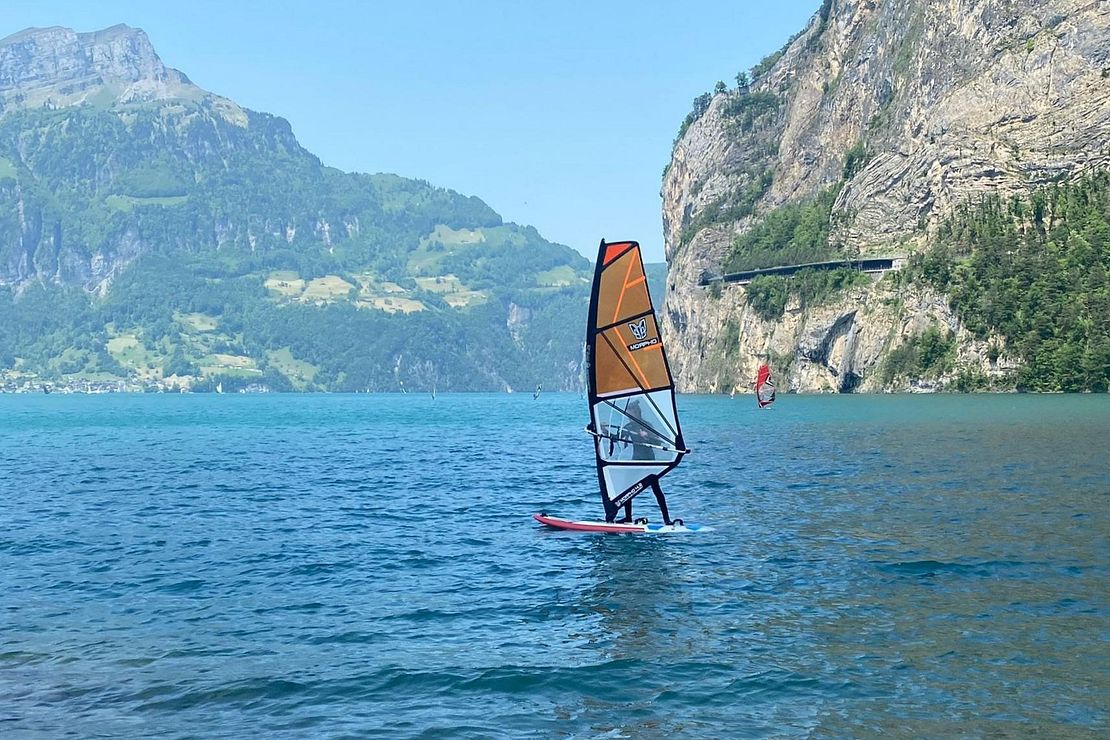
Project 3: Service
In order to successfully Coach around ten 7th graders throughout the harsh time of the “Probezeit”, I first had to take a class to learn about how our brains work, i.e. how we learn. This showed me that when people say you need to repeat things multiple times for it to enter your long-term memory, they are not reciting fake information but rather relaying an observation which relies on scientific evidence. When we took a test to find out what our "learning type" was, I realized that everyone around me got starkly different results. This reminded me that there is no real right way to study, and everyone has a different approach to it.
This is also what I had to keep in mind when it came to planning and supporting the students. Not only would each individual struggle with different subjects, but they would also have to employ different methods to overcome that struggle. While studying with Quizlet might always work out for me, others would be distracted by the web page and prefer to use real flash cards. While this seems obvious it is challenging to constantly place oneself into others' shoes and come up with innovative and unique approaches for each person. I remember feeling shocked when I first noticed that some of the students did not immediately write their homework into their agenda so as not to forget it. What seemed like an obvious and simple organizational thing to do to me, was a time intensive or brand-new idea for others. All in all, the experience made me realize that even when put into the same environment and faced with similar conditions, each person responds in their own way.
The experience also involved a lot of collaboration. At first, I only worked with Dean, my classmate who was teaching the same group of students as me. However, we soon realized that because each student struggled with a different subject, we could not help all of them alone. This led us to consult with another group of Coaching, also led by our classmates. Once our team consisted of four people, we were able to actually attend to split the students up into twice as many groups, meaning that more often than not, all students were satisfied.
When I had first looked at the aim "recognized and considered ethics of choices and actions" I felt it was a rather abstract and philosophical term to be used for a CAS project. However, about two weeks into teaching the students I was confronted with a situation that led me to do just that. I had been teaching a small group of students (about 5) French, when one of the boys asked me if I thought the grade 5 was good or bad. Previously, I had observed that this particular boy seemed to get higher marks than the rest of his peers in the Coaching class, this suspicion was only confirmed when he justified his question by saying that his father felt this was not a good enough grade. I was now faced with a dilemma: I could tell the truth and state my personal opinion of the grade had I received one (It was good but could be better) or give a conciliatory remark stating that a 5 was a good grade. The latter would encourage not only the boy who had asked the question but also those around him who regarded it as a very good grade. This seemed like the obvious choice; however, I was reluctant to lie and instead opted for something in the middle. Grades, like most other things, I said are very individual and while for one person one grade
could be seen as the best, it could be seen as middling by another person. What is more important is to recognize the effort and work which had been put into the exam.
In conclusion, this experience taught me the benefit of teamwork, the uniqueness of the mundane and to consider the impact of my words.
Julia Magon, 5i
Anja Nickel, IB-Koordinatorin
Bettina Haydon, CAS-Koordinatorin
